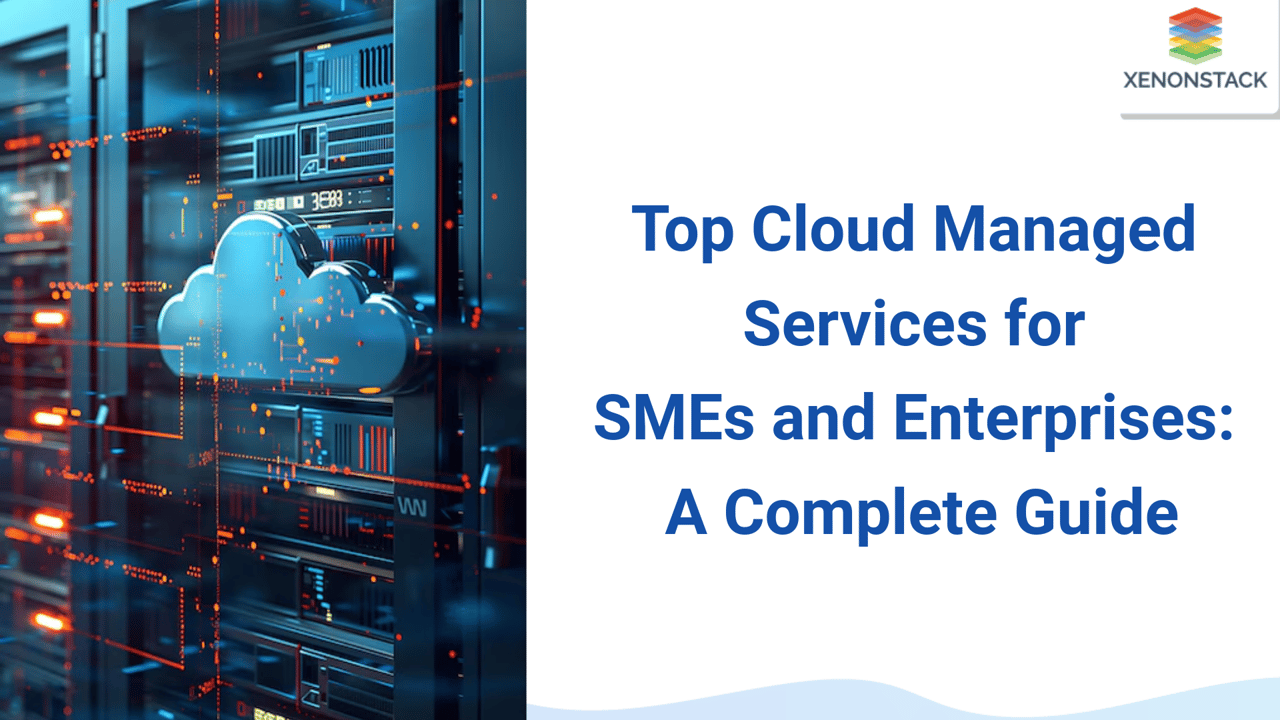
Cloud Managed Services (CMS) are transforming the way businesses manage their IT infrastructure. Whether you're a small or medium-sized enterprise (SME), a large enterprise, a government organization, or a startup, adopting cloud services can boost agility, reduce costs, and streamline operations. Below, we explore how different industries benefit from CMS and discuss the range of services available to meet unique organizational needs.
Four Segments of Cloud Managed Services
Regardless of your organization’s size, industry, or focus, cloud managed services can be broken down into four key segments that provide tailored solutions for specific business needs. These segments include:

Business Strategy and Consulting
Cloud consulting helps organizations develop cloud strategies, define migration paths, and align investments with business goals.

Technology Consulting
Technology consulting helps companies select the right tools, implement cybersecurity protocols, and integrate AI and machine learning into cloud platforms (AWS, Azure, Google Cloud, etc.).

Development and Implementation
Cloud service providers expertly deploy and optimize cloud apps and infrastructure, enhancing speed, flexibility, and cost-efficiency.

Managed Services
Managed cloud services oversee cloud management, including security, optimization, and compliance, ensuring secure and efficient operations.
What are the Key Benefits of Using Cloud Managed Services for SMEs
-
Robust Infrastructure: Supported by round-the-clock management and efficient network infrastructure, Managed Cloud Service Provider offers robust infrastructure support. They can monitor, scan, report, update patches, integrate and align network operations with your core business objectives.
-
Centralized Services and Applications: We manage all applications and services at a centralized data center. Thus, there is scope for remote data access, increased productivity, effective resource utilization, adequate storage and backup, among other advantages.
-
Data Safety and Recovery: Cloud managed services assure data safety and early access through timely backups and faster recovery across all cloud services and applications. Thus, the core objective of business continuity is achieved.
-
Quick Response Time: Addressing an issue locally is different from doing so remotely over the network. In case of cloud managed services, we take the responsibility and ensure quick response time in case of any issue saving you valuable time and effort.
-
Maintenance: Through our cloud MSP, we can offer more options on cost savings and easing maintenance burden. Outsourcing to a cloud MSP relieves your organization from costly network maintenance, thus saving you IT maintenance burden expenses.
-
Integrated Services: Our Cloud MSP services offer flexible solutions that match your business requirements. Some offer pay-per-usage or payment plans helping you prioritize your business spending. We also include converged solutions such as security protection and setting up a new service and network monitoring.
How Cloud Managed Services Improve Data Safety and Recovery
Data safety and recovery are two of the most critical concerns for any organization, and CMS plays a pivotal role in addressing these needs.
-
Enhanced Security Measures: Cloud Managed Service Providers (MSPs) implement state-of-the-art security protocols, including data encryption, multi-factor authentication (MFA), and intrusion detection systems (IDS), to protect sensitive data from external and internal threats.
Additionally, cloud environments are typically more secure than on-premise systems due to dedicated teams of experts focused on cybersecurity and compliance.
-
Regular Backups and Data Redundancy: CMS providers offer automated backup solutions, ensuring that your data is regularly backed up to secure cloud storage. In the event of a hardware failure or a cybersecurity attack, you can quickly restore your data from backup, minimizing downtime and data loss.
Many providers offer multi-region backup strategies that store your data in geographically dispersed data centers, providing additional protection against localized disasters (e.g., natural disasters, power outages).
-
Disaster Recovery and Business Continuity: Cloud Managed Services support disaster recovery (DR) and business continuity planning. DR-as-a-Service (DRaaS) ensures that organizations can recover critical systems and data in a fraction of the time it would take with traditional recovery methods.
Cloud platforms also allow for rapid failover, where workloads are moved to secondary locations in the event of an outage, maintaining service availability.
Key Challenges in Choosing the Right Cloud Managed Service Provider
Selecting the right CMS provider is a critical decision that will impact your organization's security, performance, and scalability. Here are the main challenges organizations face when making this choice:
1. Compatibility with Existing Infrastructure: One of the biggest challenges is ensuring that the cloud solution integrates seamlessly with your existing IT infrastructure. Many companies still rely on legacy systems, and migrating to the cloud can be a complex process. It’s essential to choose a provider that offers tailored solutions compatible with both new cloud technologies and older systems.
2. Security and Compliance Risks: Every organization has unique security and compliance requirements. Selecting a provider that can meet your industry-specific standards (such as HIPAA, GDPR, or SOC 2) is crucial. Ensuring your CMS provider implements the latest security protocols and provides the necessary compliance certifications is essential for safeguarding sensitive data.
3. Vendor Lock-in and Flexibility: Vendor lock-in occurs when a provider’s proprietary technologies make it difficult to switch to another provider. It’s essential to choose a CMS provider that offers multi-cloud or hybrid cloud solutions, allowing you to retain flexibility in your cloud strategy. This will ensure that your organization isn’t overly reliant on one vendor.
4. Cost Transparency: Many cloud providers offer complex pricing structures, making it challenging to predict and manage cloud-related expenses. Organizations should seek providers that offer clear, pay-as-you-go pricing models and provide cost management tools to help monitor and optimize cloud spending.
5. Service Levels and Support : The level of support offered by a CMS provider is another important factor. Ensure the provider offers 24/7 support, comprehensive service level agreements (SLAs), and a dedicated support team to address any issues quickly.
How Cloud Managed Services Help in Cost Optimization for Enterprises
Cloud Managed Services can significantly help enterprises reduce costs by offering a combination of operational efficiency, flexibility, and scalability. Here’s how CMS helps optimize costs:
-
Reduced Capital Expenditure: Enterprises no longer need to invest in costly on-premise hardware, software, and IT infrastructure. Instead, they only pay for the resources they use, shifting from a capital expenditure (CapEx) model to an operational expenditure (OpEx) approach. This reduces upfront investment requirements and ongoing maintenance costs.
-
Pay-As-You-Go Pricing: Many cloud service providers offer a pay-as-you-go pricing model, meaning businesses are billed based on actual usage rather than fixed costs. This ensures companies are not paying for unused resources and can scale up or down as their needs evolve.
-
Automation and Efficiency: Cloud providers utilize automation for routine tasks such as system updates, patching, monitoring, and backups. This minimizes manual intervention, reduces human error, and enhances operational efficiency, leading to cost savings in IT labor and management.
-
Improved Resource Utilization: Cloud services allow enterprises to scale resources on-demand, ensuring they only use the capacity they require. This optimization reduces waste and ensures the most cost-effective use of cloud investments.
-
Cost Transparency and Monitoring: Many cloud service providers offer cost management dashboards that provide detailed insights into resource usage. These tools allow businesses to track expenses in real-time, identify inefficiencies, and make adjustments to stay within budget.
Top Industries Revolutionized by Cloud Managed Service
Cloud Managed Services are versatile and can benefit nearly every industry. However, certain sectors see particular advantages from leveraging CMS:
Top Cloud Managed Services Companies
For Enterprises
Enterprises need robust IT solutions to manage complex infrastructure. Cloud managed services (CMS) help enhance security, scalability, and cost-efficiency. Key providers include:
-
XenonStack: Known for providing comprehensive cloud services, XenonStack focuses on delivering secure and compliant cloud solutions that optimize costs. They work across industries to ensure robust cloud governance, risk management, and cost-efficiency.
-
IBM: IBM offers hybrid and multi-cloud solutions, helping enterprises manage their cloud infrastructure while integrating artificial intelligence (AI) and data analytics tools. Their cloud services are reliable and flexible, allowing businesses to build and scale quickly.
-
Accenture: Accenture provides customized cloud solutions, leveraging its expertise with platforms such as AWS, Azure, and Google Cloud. Their services include strategic planning, migration, and managed services, ensuring businesses achieve innovation, scalability, and cost-efficiency.
-
Cognizant: It Provides end-to-end cloud management services, including migration, optimization, and security across AWS, Azure, and Google Cloud. Their solutions help enterprises enhance efficiency, agility, and reduce costs, driving digital transformation tailored to industry needs.
-
Capgemini: Specializing in cloud migration and integration, Capgemini helps enterprises transform their IT landscape with scalable and optimized cloud solutions. Their services help streamline business operations and enhance collaboration.
For SMEs
Small and Medium Enterprises (SMEs) often require cost-effective and scalable cloud solutions to manage their IT infrastructure while ensuring security and compliance. CMS provides these businesses with the flexibility to scale without the burden of large capital expenditures.
-
Microsoft Azure: Known for its scalable and affordable cloud services, Azure offers strong security features and seamless integration across platforms, making it a popular choice for SMEs looking to manage their infrastructure more effectively.
-
AWS: With its robust and reliable cloud infrastructure, AWS offers cost-efficient solutions designed to help businesses of all sizes scale quickly. AWS ensures that SMEs can optimize their cloud usage, only paying for what they need.
-
Google Cloud: Google Cloud provides advanced data analytics and AI tools, which SMEs can leverage to gain insights into their business operations. The platform is known for its strong infrastructure and efficient scaling capabilities.
-
Rackspace: Rackspace provides tailored cloud management solutions, helping businesses achieve cost optimization through a fully managed service. SMEs can take advantage of Rackspace’s expertise in cloud deployment and optimization.
-
Zoho: Zoho offers a suite of business applications such as CRM and financial tools, making it easier for SMEs to run and manage their operations. Their cost-effective solutions help businesses enhance productivity and collaboration.
For Startups
Startups often need fast, flexible, and cost-effective solutions to scale quickly. Cloud services are ideal for these businesses, providing the infrastructure needed for rapid growth without the overhead of traditional IT management.
-
AWS Activate: This special program offers startups credits, training, and support for AWS services, helping new businesses launch and scale their cloud-based products or services efficiently.
-
Google Cloud: Google Cloud offers cloud credits and various tools to assist startups in app development, AI integration, and data storage. Their services are tailored for scalability and speed, which is essential for fast-growing startups.
-
Microsoft for Startups: Through this initiative, Microsoft provides startups with free cloud credits, access to Azure support, and a set of business tools that are crucial for early-stage companies looking to scale their operations.
-
DigitalOcean: Known for its simplicity and affordability, DigitalOcean provides startups with cloud solutions for hosting, database management, and other essential services that help businesses grow without breaking the bank.
-
Heroku: Heroku is a platform-as-a-service (PaaS) that allows startups to build, run, and scale applications quickly. It simplifies app development and deployment, allowing startups to focus more on development rather than infrastructure management.
For Government
Government agencies require secure, compliant, and reliable cloud services to meet stringent regulatory requirements. Cloud Managed Services for government organizations provide these capabilities while also offering scalability and cost-efficiency.
-
AWS GovCloud: AWS offers a cloud platform specifically designed for government agencies, ensuring that all services comply with strict U.S. government regulations. This secure and scalable platform is ideal for federal, state, and local governments.
-
Microsoft Azure Government: Azure offers compliant cloud solutions specifically for U.S. government agencies. With built-in security and governance features, Azure Government ensures that sensitive data is protected while enabling innovation.
-
IBM Cloud for Government: IBM Cloud offers secure, hybrid cloud solutions designed for government use. It combines security, compliance, and performance, helping government agencies enhance their digital transformation efforts.
-
Google Cloud for Government: Google Cloud provides secure and scalable cloud solutions tailored to government needs. Their focus on data management and AI makes it an ideal choice for innovative solutions within the public sector.
-
Oracle Cloud for Government: Oracle offers highly secure, compliant, and efficient cloud solutions for government organizations, helping streamline operations and meet regulatory demands.
-
Cisco: Offers secure cloud infrastructure and managed services for government organizations, with a focus on enhancing network security, compliance, and operational efficiency.
Turning Your Cloud Vision into Reality
At XenonStack , we understand that adopting cloud technologies can be a transformative journey for your business. Our Cloud Managed Services are designed to help you realize your cloud vision with the following offerings:
-
Cloud Strategy and Consulting: We work with you to design a comprehensive cloud strategy that aligns with your business goals, including cloud migration, optimization, and scaling plans.
-
Cloud Infrastructure Management: Our team takes care of your cloud infrastructure, ensuring it’s secure, scalable, and cost-efficient. We provide proactive monitoring, management, and optimization.
-
Data Security and Compliance: We prioritize the security of your sensitive data by integrating robust security frameworks and ensuring compliance with industry regulations.
-
24/7 Support: Our dedicated support team is available around the clock to assist with any cloud-related issues, ensuring minimal downtime and uninterrupted service.
Whether you're looking to optimize your existing cloud infrastructure, migrate to the cloud, or ensure disaster recovery, we provide the expertise and resources to help you achieve your cloud goals.
Embracing the Power of Cloud Managed Services
Cloud Managed Services are crucial for businesses of all sizes and industries to leverage the benefits of cloud technology while minimizing the complexities of managing infrastructure and applications. Whether you're a large enterprise, a startup, or a government organization, CMS providers offer tailored solutions to help you scale efficiently, secure your data, and optimize your IT operations.
By aligning your business needs with the right service providers, organizations can gain access to flexible, secure, and scalable cloud services that drive innovation, cost optimization, and business growth. Let cloud services be the key to unlocking your digital transformation, improving agility, and gaining a competitive edge.
Next Steps in Cloud Managed Services
Talk to our experts about leveraging top cloud managed services to enhance scalability, security, and cost-efficiency for SMEs and enterprises. Discover how these solutions streamline operations, improve resource utilization, and support business growth by optimizing IT infrastructure and cloud management/




